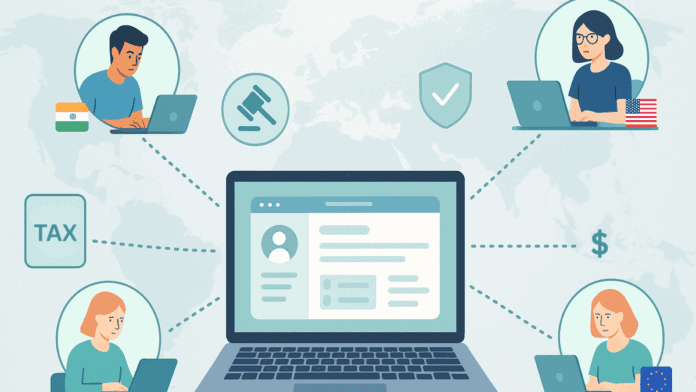Global employment marketplaces like Upwork and Toptal are changing how people work. These platforms connect freelancers with companies worldwide. They make hiring fast and flexible. Workers can find jobs from anywhere, and businesses can hire talent without borders. But this new way of working is causing big challenges. Labour laws, which are rules about work, are struggling to keep up. This article explores three main issues: worker classification, taxation, and employment obligations. These platforms are under growing scrutiny because they disrupt traditional work structures. Let’s break it down.
What Is Worker Classification, and Why Is It a Problem?
Worker classification is about deciding if someone is an employee or a freelancer. Employees get benefits like health insurance or paid leave. Freelancers, also called independent contractors, usually don’t. Platforms like Upwork and Toptal treat most workers as freelancers. This saves companies money because they don’t pay for benefits. But some workers and governments argue this isn’t fair.
In many countries, labour laws say workers deserve certain rights. For example, if someone works full-time for one company through a platform, they might act like an employee. But the platform might still call them a freelancer. This can lead to lawsuits. Governments are looking closely at these platforms. They want to make sure workers aren’t missing out on rights like minimum wage or sick leave. Misclassifying workers can also mean companies avoid taxes or insurance costs, which creates tension with regulators.
The problem gets trickier with borderless hiring. A worker in one country might work for a company in another. Each country has different labour laws. Platforms must figure out which rules apply. This confusion is a big reason why regulators are paying attention.
???? M&A Deals Destroyed by Hidden Labour Law Traps—What No One Tells You!
Taxation: A Puzzle Across Borders
Taxation is another headache for global employment platforms. Taxes are money people and companies pay to the government. When workers are hired across countries, it’s hard to know who pays what. Freelancers on Upwork or Toptal might live in one country but work for clients in another. Each country has its own tax rules. This makes things complicated.
For example, a freelancer in India might work for a U.S. company. The platform might not withhold taxes, leaving the freelancer to report their income. But some countries expect the platform or the client to handle taxes. If taxes aren’t paid correctly, governments lose money. This is why some countries are cracking down on these platforms. They want to ensure taxes are collected properly.
Another issue is double taxation. This happens when a worker pays taxes in two countries for the same job. Some platforms try to help by offering tax forms or guides. But it’s still confusing for freelancers and clients. Governments are pushing for clearer rules to avoid tax problems. This scrutiny is growing as more people use these platforms.
Employment Obligations: What Do Workers Deserve?
Employment obligations are the benefits and protections workers should get. These include things like health insurance, paid vacation, or retirement plans. In traditional jobs, companies often provide these. But on platforms like Upwork and Toptal, freelancers are responsible for their own benefits. This can be tough, especially for workers who rely on these platforms for full-time income.
Switzerland’s Beneficial Owner Register Hits Back at Shell Companies
Some governments think freelancers deserve more protections. For instance, if a freelancer works regular hours for one client, they might be seen as an employee. This could mean the client or platform has to offer benefits. But platforms argue they’re just middlemen connecting workers and clients. They don’t want to be responsible for these costs.
Borderless hiring makes this even harder. A freelancer in one country might have different rights than a client in another. For example, European countries often have strict labour laws. They might demand benefits for workers, even if the client is in a country with looser rules. Platforms have to navigate these differences, which is why regulators are watching them closely.
Why This Matters to Everyone
Global employment platforms are growing fast. They give workers freedom to choose projects and companies flexibility to hire talent worldwide. But they’re shaking up old work rules. Governments want to protect workers and ensure taxes are paid. This puts platforms like Upwork and Toptal in a tough spot. They have to balance their business model with growing legal demands.
Freelancer platforms, tech employers, and digital policymakers are all affected. Platforms need clear rules to operate. Employers want to hire without legal risks. Policymakers must create laws that work for a global workforce. These challenges show how new technology is forcing everyone to rethink work. The scrutiny on these platforms is only getting stronger as more people join the freelance economy.


